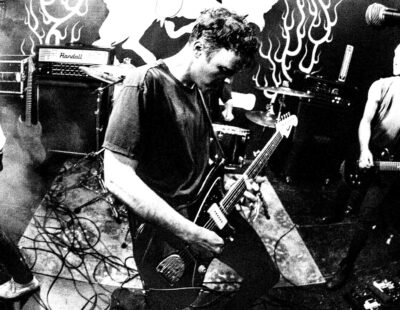** If you’ve ever visited a large city, it’s readily apparent between trash-strewn alleys, huge skyscrapers, and rush hour hustle ‘n’ bustle, decay is happening. Cities—from Aborym’s home in Rome, Italy and New York City to Oslo and Miami—are slowly rusting and dying from the inside out. Add humans to the equation and cities turn into cesspools of oxidation and dead dreams. This is what Aborym are trying to paint on new album, Dirty. We corner Malfeitor Fabban as he sifts through spent drug needles and rescued MIDI controllers.
Where do you think Aborym fits in the overall schema of metal?
Malfeitor Fabban: In the fucked up area man! (kidding…) Well, I’ve no idea. Is it necessary to be included in a musical context? I mean, I believe it could be difficult for a band like Aborym.We did not choose to play this or to play that. We simply play. Got it? We had the need of something really shocking and eye-poppin’, like to wake up in a hospital after speedballing, something really dangerous like heroin and cocaine mixed together and injected together in a single fuckin’ shot.
Is black metal still recognizable in Aborym at this stage?
Malfeitor Fabban: Black metal belongs to the past, to our roots maybe. Now we are very far from black metal. We’re an active part of a very private and exclusive club made for very few bands that actually can and want to make music without limits, rules and music business dictates.
Are you following in the footsteps of others—like Thorns for example—or venturing out into uncharted territory? Just curious how you view Aborym’s trajectory.
Malfeitor Fabban: Thorns is a cool band, but it’s not an influence for Aborym. To me the real matrix, the true and fundamental mix in between metal, industrial music and electronic has been created by Trent Reznor and his Nine Inch Nails even if we try to not be influenced by any other bands. We want to sound like Aborym. Aborym is a band that changes its skin year after year, disc after disc. The changing, metamorphosis, experimentation, are elements of our musical DNA. We’re not able to realize an album with 8-10 tracks all similar to each other, so not even albums. The many people who follow us since the ‘90s are used to our continuous changing and mood swings, and this is one of the peculiarities of this band. The metamorphosis of Aborym have always been oriented to achieve something that is not conceivable or imaginable: we like to catch our listeners unprepared, we love destabilizing them, and give them new emotions and feelings that they never had until that moment. This metamorphosis, in my opinion, has traveled in parallel with an evident musical, technical and attitudinal growth.
What kind of advancements—whether technological or compositional or both—have you made to Aborym since Psychogrotesque?
Malfeitor Fabban: Dirty has been written starting from synths and hard disc recording, MIDI stuff and so on. And we decided to work like this in order to get the weirdest, coolest, powerfulest Aborym album ever, something really heavy, psycho and innovative. A real eye-poppin’ unexpected piece of art. We strongly wanted our sound to be more cold and modern and at the same time full of weird melodies, arrangements, new ideas and new way to combine different styles and music. The work and the details of the electronic and industrial structures of Dirty were treated to an almost fanatical level and the result is very, very high. We use synths a lot, keyboards, we work a lot on hard disk, we write MIDI and abuse of samplers and VST. We have thousands and thousands of sounds and through software we manage to modify them and made them sound like we want. All of this is like a real trip,my friend! We decided to give to Aborym a strong industrial brand, plagiarizing even more the most damn fierce metal with electronics, using the power of synths, machines, software, of sound cleanliness and as well the power of a total absence of any rules that are not ours.
Describe the contribution of the other members to the music making process for Dirty. Is it collaborative, confrontational, expansive or all of the above?
Malfeitor Fabban: I deal with the songwriting with Paolo. Bard takes action when all the tracks have been set and when we defined the structures of drums and time. It’s great teamwork. Paolo is a professional and talented musician, a person with whom it’s just a pleasure to make music with. He’s also vocalist and guitarist in Hour of Penance, a death metal band.
Over time, what have you learned to not include in Aborym’s soundscape? It’s pretty dense.
Malfeitor Fabban: We went beyond every conceivable scenario and we created new fuckin’ music for a new fucked up generation. This album is another demonstration of how music can be universal. Just keeping up, keeping up with the times and staying on top of things helps to keep us going.
Aborym started off as a covers band. Does Dirty II bring everything full circle?
Malfeitor Fabban: I don’t want to say I get giddy like a little girl, but it was exciting for me to record songs like “Hurt” by Nine Inch Nails”, Pink Floyd’s “Comfortably Numb”. These two versions represent for us a real tribute to Pink Floyd and Nine Inch Nails, and I have tried hard to try to sing these two songs in such a way as similar as possible to the original. It has been a fantastic experience for me, to able to sing these two songs, believe me. As far regard the Maiden’s “Hallowed…”, we wanted to propose a classic of heavy metal music played in Aborym-style without fucking compromises. We played three or four times faster, sung in streaming, we used synth, electro patterns, keyboards and all that could do absolutely sound disturbing and crazy. Our version of “Hallowed Be Thy Name” should have sounded exactly like that.
You’ve also included fan recorded material as well as your own as part of the splice-in compositonal process. What was working with all those sources like?
Malfeitor Fabban: “Need for Limited Loss.” It’s a song written by Alberto Penzin (CO2, former Schizo) on which we have mounted a series of riffs, samples, scores, screaming and lyrics that some fans have sent us. The idea was to create a song with them and it was a great experience! The entire second disc of Dirty is our way of thanking our fan-base, a second CD dedicated to them and partly achieved with them, all to celebrate even if with some delay, 20-years of Aborym.
What do you want to communicate on Dirty?
Malfeitor Fabban: Crisis (economical, social, spiritual), social seclusion and isolation… That’s why I love the “city” concept: you can feel alone even if you are surrounded by millions of people, millions of lights, clubs, streets, technology, attractions and so on… Sexual repression, urban violence, diseases, complex-unstable, often violent kind of relationship. I just wrote about something I can see everyday in my city. My only great inspiration, what actually pushed me to write lyrics like that, is the everyday life, my daily careful study on the people I meet everyday. It’s exactly a cross-section of the modern society, lyrics that talk to things visible to everyone. Everything that surrounds us is a huge container of shit and piss and this fucking planet is falling apart. I see it this way, Dirty is completely based on that and it is also loosely based on what we did starting in 1992, getting in fights, waking up messed up and drunk in strange dirty beds, drug addiction, alcoholism.
Dirty is a challenging listen. What do you think the listener walks away with after experiencing Dirty?
Malfeitor Fabban: I don’t care. Becoming more mature with the music and growing as our audience grows, we just don’t limit ourselves by staying at the same level. It’s hard for me sometimes to explain what I mean. If you are a non-open-minded boring braindead, well, better to stay away from Dirty. This album is for gourmets.
** Aborym’s Dirty is out now on Agonia Records. It’s available HERE for order. Unless you’d rather go here and buy a Skrew record, of which none have aged gracefully.






